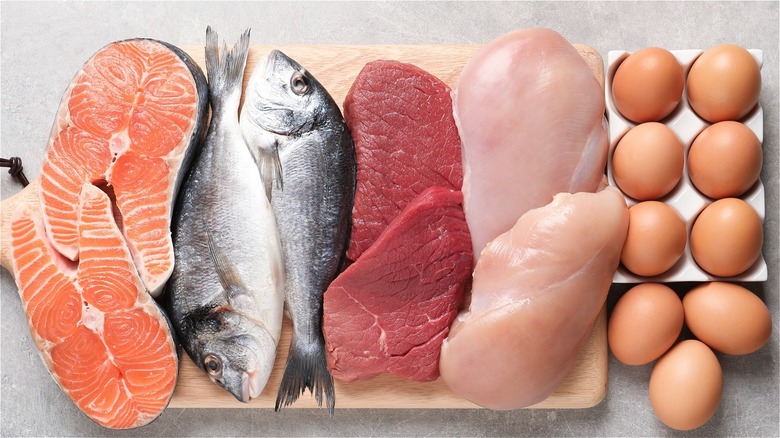The Type Of Fat You're Eating Matters More Than You Think
When reading nutrition labels, trying to keep track of how many fats appear on the list could make anyone's head spin. According to the American Heart Association, anyone watching their fat intake should monitor saturated fats, trans fats, monounsaturated fats, and polyunsaturated fats. You can start to identify these fats by remembering that saturated and trans fats typically have a solid state at room temperature (as is the case with butter), while monounsaturated fats and polyunsaturated fats usually have a liquid state, as oil does. Experts have found that these different kinds of fats play varying roles in your personal nutrition.
A recent study presented at the American Heart Association's 2021 Scientific Sessions found that consuming certain types of animal fat is linked to a higher chance of having a stroke, NBC reports. Study participants who ate larger amounts of animal fat (including fat from red meat but excluding fat from dairy) were 16% more likely to have a stroke, while those who ate more vegetable fats, like olive oil, saw a 12% lower chance of having a stroke. The findings suggest that the type of fat you consume — rather than the amount of fat you eat in general — matters more to your overall health.
How to make sure your meals have the best fats possible
If you like the idea of fully switching over to plant-based fat, make sure to closely examine the foods you choose. Rather than replacing meat with processed vegetarian products, which can often come with extra salt and sugar, experts suggest focusing on whole foods like lentils and beans, according to NBC. For better heart health, nutrition specialists urge consumers to replace lard or tallow with soybean, corn, or olive oil.
You don't necessarily need to go completely vegan after reading the study, dietician Tracy Severson told NBC. Simply "swapping even one meal of red meat a week and replacing it with an unprocessed vegetarian option is going to be good for cardiovascular health." While keeping track of every type of fat you consume might feel daunting, these findings can give you a better idea of their impact on your body.

